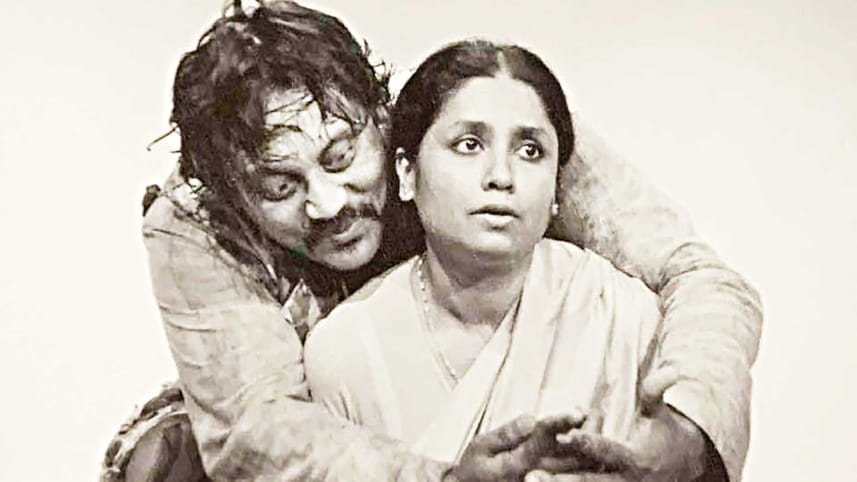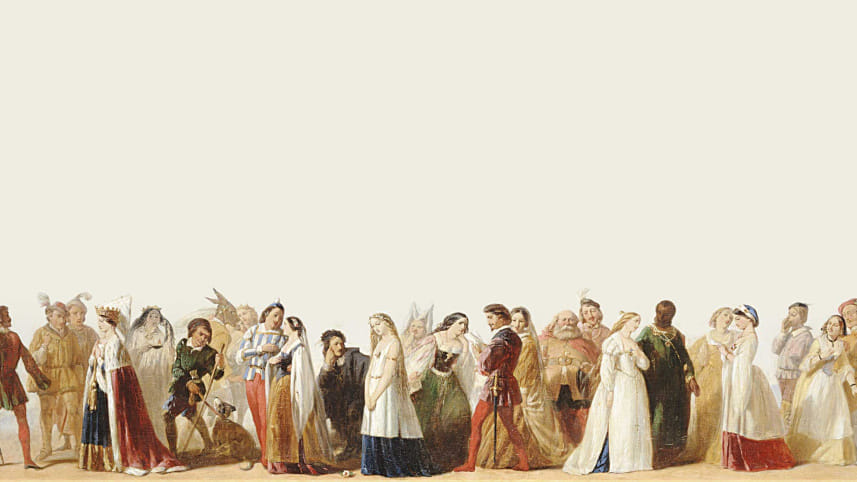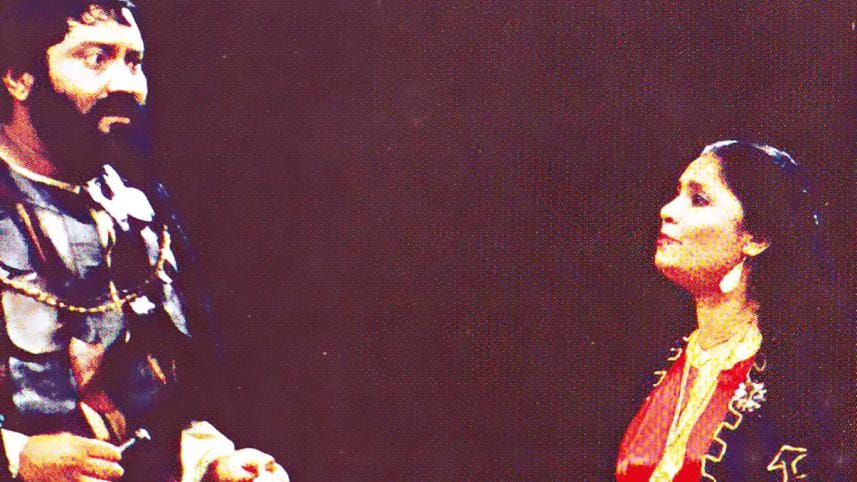A search for the Shakespearean semiotics in Bangladesh

This writing celebrates how Bangladesh has practised a 'disturbingly relevant' legacy of William Shakespeare through a testimonial of Aly Zaker, a phenomenal figure in the cultural arena of the country. This piece is the condensed form of an interview with Aly Zaker that was taken on February 2, 2020, a few months before his passing. It serves as a reminder that 'life is a tale…full of sound and fury, signifying nothing'. However, this writing reads Shakespearean 'nothingness' as a 'signifier' via Aly Zaker, where 'nothing is more real than nothingness.' Indeed, it was enlightening to meet him and the meeting led to the revelation of an ever-unexplored area of performing Shakespeare's dramas in Bangladesh. Aly Zaker had played the protagonist roles in groundbreaking productions of Macbeth and The Tempest in the 1980s, and also adapted Hamlet in Darpan, which he directed in the early 1990s.
The appeal of cultural universalism
Aly Zaker observed that performing Shakespeare in this region was an anti-colonial expression. His opinion revealed a complex post-colonial society, where the cultural inheritance of colonialism, after a certain period, had become a sharp, double-edged sword, indicating a creative protest against colonialism itself. Like many post-colonialists, he considered the case of appropriating Shakespeare as a political act in the cultural front. For him, Shakespeare's plays were not a cultural imposition. Instead, his plays became a weapon with which artists fought against imperialist values. Aly Zaker shares, "Shakespeare has always come to us as a playwright through whom we have resisted colonial invasion. That is what we have always done. And this is the tradition behind our practice of Shakespeare."

Taking an example from one of Shakespeare's most performed tragedies, Macbeth, Aly Zaker stated that 'This is the culmination of the political overture of Shakespeare. It is equally important in any society; particularly in a colonial one'. He added, "Shakespeare as a playwright has a universal appeal." Although, Aly Zaker opines, colonialism brought Shakespeare to this region, his universalism functioned as a political force which the local practitioners used creatively against the English rule. He defined Shakespeare as a symbol of cultural universalism, which is distinct from the political universalism of colonialism. Zaker argued that the 'humanity' and 'social relevance' of Shakespeare's plays made him the greatest playwright of all time. "I find a simple realism in Shakespeare," he said. Moreover, Aly Zaker criticised those who intellectualised Shakespeare and made him 'abstract'.
Macbeth as a metaphor for General Ershad
Aly Zaker looked back on how the 'social relevance' and 'simple realism' of the production of Shakespeare's plays criticised and resisted the military dictatorship during 1980s. He told me a story about the performance of Macbeth, which was translated into Bengali by the eminent litterateur Syed Shamsul Haque and directed by Christopher Sandford. The play was produced by the British Council and two leading theatre groups, Theatre and Nagorik Natyasampraday. It was premiered on December 8, 1982 at the British Council auditorium in Dhaka. Only eight months ago, Lieutenant General Hussain Mohammad Ershad, as the Chief of the Army Staff, had seized power through a bloodless coup. Aly Zaker recounted a unique memory of the show:
"I was playing the role of Macbeth. I just took the crown off and leaned against the big banquet table. The crown was in my hands. I stared at this crown for a while and then looked at the audience. Suddenly, I noticed that Air Vice Marshal Sultan Mahmud, chief of Bangladesh Air Force, was seated in the front row, watching our performance. He was also , then, the deputy chief martial law administrator and a collaborator of General Ershad. Looking directly at him, I said the dialogue 'Eta Howa Kichhu Noy, Eta Hoye Thakatai Kichhu' (the Bengali translation of 'Nothing to be thus, but to be safely thus'). I noticed him getting distinctly uncomfortable. It was as if he was scared. He might have thought 'Is the young actor telling me: You got the crown, but will you remain on the throne?"
Aly Zaker revealed that such performances were protests against autocratic tyranny. However, the protests were performed through art, they were not demonstrations. He had sensed, "the military collaborator's soul suddenly shuddering". Presumably, it was a moment when theatre encountered politics. It was, therefore, a defining act where the stage's text met the state's metatext.

Hamlet as Darpan of Bangladesh
After acting in the roles of two memorable characters Prospero and Macbeth in the 1980s, Ali Zaker attempted to adapt Hamlet in Darpan (lit. Mirror), which was produced by Nagorik Natyasampraday, a prominent Dhaka-based theatre group established in 1972. He created Darpan in 1991, when Bangladesh began a new journey towards a democratic parliamentary government system, following the fall of General Ershad's regime. The countrymen witnessed the emergence of iconic female leaders in the power-play of the state. At the same time, imprisoned General Ershad also remained a significant political force in the Parliament. The country remained agro-based in the context of its mode of production and semi-feudal in regards to its social system. In such a socio-political setting, Aly Zaker adapted Hamlet, giving his version the title Darpan. He defined this work as being inspired by Hamlet, rather than being a 'carbon copy' of the original. In his own words, "During that time, I thought that Hamlet was the Darpan of Bengal". Considering Hamlet as the 'Mirror of Bengal,' he explained his idea behind this work:
"Essential to youth is their rebelliousness, being much more relevant in our society than the Western one. I never treated Hamlet as an outsider. The euphoria, the anger, and the dissatisfaction in Hamlet, in my opinion, reflect the characteristics of our society. In my translation of Hamlet, you will find the essential truth of that play."
In Darpan, he superimposed Hamlet on the village society of Bangladesh, creating a mirror image to seek the true face of rural Bangladesh. However, the question remained: Why take Hamlet as a reference point in order to examine the mirror image of our society? Zaker had to balance between two elements: his desire to communicate with the people and his passion for Shakespeare. He prioritised the state of affairs of the country in his work. He explicitly mentioned that as the translator he had to take up the role of an 'explainer': "I worked as an interpreter of Shakespeare rather than a Shakespeare educator in the context of our society." Also, he acknowledged how he had gotten the inspiration from German playwright Bertolt Brecht to rework the Shakespearean literature: "In the translation of Hamlet, the person who inspired me a lot was Brecht, who said, 'if one can change Shakespeare, then one can.' If I had not been inspired by Brecht, I would have not been able to complete the project."

In his adaptation, Aly Zaker used poetic diction from the rural dialect of Bengali. He argued, "I am a son of a village. The simile, images and figures of speech come very easily through the dialect, not from the 'Rabindrik' language' (Aly Zaker used the term to define an elitist form of standard Bengali)." However, in his own time, Shakespeare used people's language, but, now, the public diction is absent, which reflects an elitist practice of Shakespeare in this country. In reconstructing Shakespeare, he renamed Hamlet as Darpan, Ophelia as Qulsum, Gertrude as Begum and Claudius as Mridha. However, Zaker did not change the internal structure of the characters as was used by Shakespeare in the original text of Hamlet. Instead, he attempted to recreate the characters in such a way, so that the play could appeal to the collective psyche of the society. Referring to the early translations and adaptations of Shakespeare in the theatre in Bangladesh Aly Zaker opined, "In the beginning, it was starchy. The translation our respectable Bazlul Karim did was an act of teaching. It was almost as if he had tried to give the people a lesson about Shakespeare in his translation." Zaker appreciated Syed Shamsul Haque's work: "There is no doubt that Syed Haque was the finest translator of Shakespeare in the Bengali language. In fact, he is better than Rabindranath. This is because Syed Haque was so engaged with the correctness of expression. He was so involved in the craft of language."

Aly Zaker rejected the elitism of the Bengali language in the appropriation of Shakespeare in Bangladesh because artificial poeticism creates a problem in the spontaneous flow of people's language. He claimed that directing Shakespeare was essentially what he 'took from life': 'I have no method. When a play moves my inner being, I do that play."
Role of a storyteller
Going through the conversation, I learned that Aly Zaker used to tell the character's story, particularly in the case of playing Prospero, in a uniquely effortless way that could communicate easily. He recalled:
"I always tried to create the appropriateness in playing the role, whichever was given to me. I didn't find any difference in playing Shakespeare's characters with Ibsen's or Brecht's. I always considered the character in the context of the story. Shakespearean diction was not essential for me because these came to me through translation. I didn't act in English. I performed Shakespeare in Bengali. So, I avoided this paraphernalia. Rather, I tried to get to the core of the character. If you want to have the taste, you should have the taste of essence."

Instead of conclusion
The secret behind the practice of Shakespeare has been somewhat uncovered by Aly Zaker. "My Shakespeare is a human being," he said. He believed that there was no other realistic playwright in the English language like Shakespeare. For him, the reality of Shakespeare's plays reflects the very humanity of the playwright himself. As a playwright, he added, "Shakespeare is the closest to the human heart in every way". He lamented that the impact of the bard "should have been felt more in the post-colonial, modern culture of Bangladesh." "we just touched his works superfluously. We never got to understand the essence of Shakespeare," he added.
[The writer of this article is deeply indebted to eminent cultural personality Sara Zaker and renowned theatre director Professor Israfeel Shaheen for their graceful co-presence during the interview with Aly Zaker, and Professor Michael Dobson, director of the Shakespeare Institute, for allowing the writer to travel to Bangladesh during a term-time of the PhD programme.]
Shahman Moishan is a playwright, director, and art writer. He is an Assistant Professor (on leave) at the University of Dhaka. He is currently pursuing his PhD at Shakespeare Institute, School of English, Drama and Creative Studies, University of Birmingham, England.



 For all latest news, follow The Daily Star's Google News channel.
For all latest news, follow The Daily Star's Google News channel.
Comments